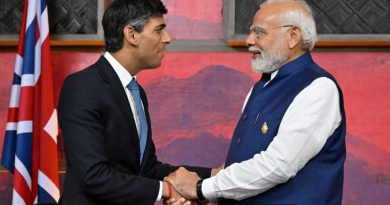U.S. and Japan sound alarm on China, seek new defence collaboration
Tokyo/Washington (Reuters) – The foreign and defence ministers of the United States and Japan on Friday voiced concerns about what they said was China’s ongoing efforts to undermine rules-based order, as they look to cooperate more on emerging defence threats.
The officials from the two allies met virtually to discuss modernising and strengthening their security alliance at a time when concerns about China – and increasing tension over Taiwan – have put Japan’s security role in greater focus.
The ministers “resolved to work together to deter and, if necessary, respond to destabilising activities in the region,” according to a joint statement following the talks.
The ministers said they had “serious and ongoing concerns” about human rights issues in China’s Xinjiang and Hong Kong regions and underscored the importance of peace and stability in the Taiwan Strait.
Earlier, U.S. Secretary of State Antony Blinken said the two countries would sign a new defence collaboration deal to counter emerging threats, including hypersonics and space-based capabilities.
Blinken said the U.S.- Japan alliance “must not only strengthen the tools we have, but also develop new ones”, citing Russia’s military buildup against Ukraine, Beijing’s “provocative” actions over Taiwan and North Korea’s latest missile launch.
North Korea fired a “hypersonic missile” this week that successfully hit a target, its state news agency said.
Russia, China and the United States are also racing to build hypersonic weapons whose extreme speed and maneuverability make them hard to spot and block with interceptor missiles.
“We’re launching a new research and development agreement that will make it easier for our scientists, for our engineers and program managers to collaborate on emerging defense related issues, from countering hypersonic threats to advancing space based capabilities,” Blinken said at the opening of the meeting.
U.S. Defence Secretary Lloyd Austin said the meeting would help lay down a framework for the future of the security alliance, including evolving missions to “reflect Japan’s growing ability to contribute to regional peace and stability.”
As its neighboring countries are testing hypersonic missiles, Japan has been working on electromagnetic “railgun” technology to target those missiles.
Japanese Prime Minister Fumio Kishida’s government last month approved record defence spending, with a 10th straight annual increase in 2022.
Top Japanese officials have said that developing enemy base strike capabilities is an option to consider to boost defense, but some experts say such a move might hit hurdles such as a theme of pacifism in domestic politics.
Japanese Foreign Minister Yoshimasa Hayashi told his U.S. counterparts that the international community faces challenges including “unilateral corrosive attempts to change the status quo, abusive use of unfair pressure and the expanding authoritarian regimes”.
The two nations will also sign a new five-year agreement covering the continued basing of U.S. troops in Japan, Blinken said, in a deal where Japan has agreed to pay $9.3 billion to share the upkeep of U.S. forces in Japan over five years.



